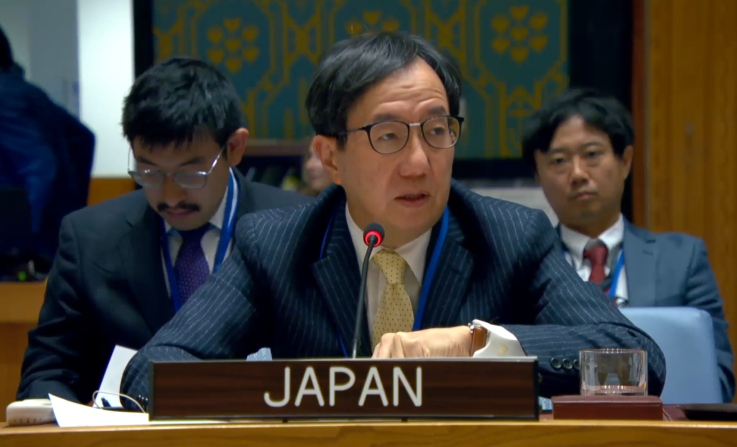Statement by H.E. Ambassador YAMAZAKI Kazuyuki, Permanent Representative of Japan to the United Nations, at the United Nations Security Council Briefing on the Situation in Sudan (Resolution 2715 (2023))
2024/10/28

(As delivered)
Thank you, Madam President.
I also thank the Secretary-General for his sobering briefing on the situation in Sudan, especially on his latest report about the protection of civilians in the country.
Now that it has been submitted to the Security Council, it is our responsibility to take action on the basis of his recommendations.
I thank Ms. Eltigani for her briefing.
Your voice is critical to enhancing our understanding of what is happening on the ground. I also welcome the presence of the representative of Sudan.
Madam President,
Eighteen months have passed since the outbreak of violence in Sudan. Just within this year, this Council has passed two resolutions calling for the cessation of hostilities, which regrettably have not been honoured. These calls for a ceasefire have been repeated not only by the United Nations but also by regional and sub-regional organizations and individual Member States. The Secretary-General’s report has been one of the latest on the list.
First and foremost, as the Secretary-General has called for in his report, General Burhan and General Dagalo must stop fighting immediately. The international community has to strengthen its concerted diplomatic efforts to urge the parties to return to serious negotiations. Japan supports Mr. Lamamra’s role of good offices and his work to coordinate and complement international and regional efforts and those by Member States.
Second, Japan remains gravely concerned about the prolonged anguish that the people of Sudan are experiencing.
During the High-Level Week, we heard courageous testimonies by Sudanese women. Any form of sexual and gender-based violence is unacceptable. Japan is also concerned about recent reports of escalating armed violence in Jazirah State.
Sudan’s acute food insecurity is also alarming, and women and children are particularly affected. The use of starvation of civilians as a method of warfare may constitute a war crime.
The parties must allow and facilitate a full, rapid, safe, unhindered and sustained humanitarian assistance to those in need across Sudan, including cross-border and crossline activities, as well as the security of all humanitarian personnels on the ground.
Japan demands the parties to uphold their obligations under international law and calls particularly on the Sudanese Armed Forces (SAF) and the Rapid Support Forces (RSF) to fully honour their commitments declared in Jeddah and after the proximity talks in Geneva and the talks facilitated by the ALPS group.
In this vein, Japan welcomes the passage of hundreds of trucks through the Adre border crossing since August following the decision of the Government of Sudan and calls on the government to continue to allow the use of this crucial crossing point.
Third, Japan echoes the Secretary-General’s call that the flow of weapons and ammunition into Sudan must cease immediately.
Japan reminds all the Member States that those who violate the arms embargo measures set out in the relevant Council resolutions may be designated for targeted measures.
Last but not least, Japan stresses the importance of monitoring, reporting, collecting evidence and documenting violations of international humanitarian and human rights law. The violators must be held accountable. In this regard, Japan supports the important work of the Independent International Fact-Finding Mission for the Sudan established by the Human Rights Council, as well as those works of the Panel of Experts of the Sudan Sanctions Committee, national, regional, and international NGOs, journalists, and CSOs among others.
To conclude, I would like to reiterate that the United Nations and its Member States will never forget Sudan or leave its people behind.
I thank you.
